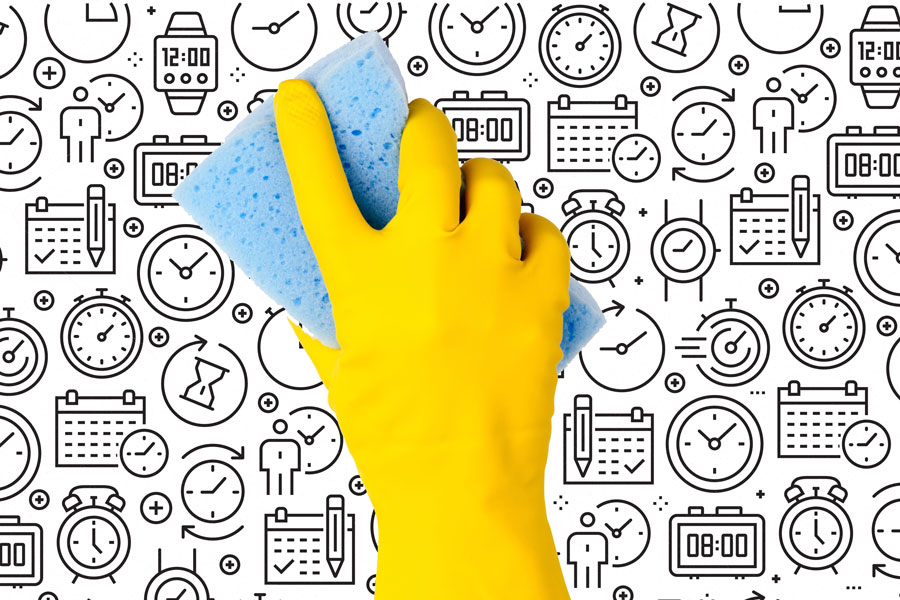Why Washing My Dishes by Hand Is the Best Part of My Day
Yes, I have a dishwasher. But hand-washing my dishes reminds me to be patient, mindful and self-reliant.

Hand-washing dishes, rather than relying on a dishwasher, is the self-care ritual of Laura Brzyski, Be Well Philly’s digital contributor. / Images via cnythzl, pepifoto, and Getty Images.
Welcome to Ritual, Be Well Philly’s new column of essays about the low-tech, purposefully inefficient things we do that pleasurably slow us down. From taking the long way home to hand-washing dishes, these simple habits allow us to be more present — even if only for a few minutes.
It’s 7 p.m. in my Rittenhouse apartment. I’ve finished having dinner, and I’m settling in for the evening. I take a long, appraising look at the sink — it’s a bit full.
I walk over, roll up my sleeves, pour Dawn on a sponge, turn on the faucet, and settle in to scrub for a while.
This isn’t the “rinsing” most people (who have dishwashers) do before loading their plates, utensils, glasses and what have you into the machine. I’ll be here for a little while. Even though I don’t hand-wash my dishes every single day (and I’d probably run out of dinnerware if I cleaned them only once per week), it’s a practice I enact when the time’s right, when I’ve noticed my sink has become bloated and overrun and beckons for some breathing room.
The thing is: I have a dishwasher.
That wasn’t always the case. When I first started living on my own nearly eight years ago, I was a first-semester grad student in the Lehigh Valley. My two-bedroom apartment, on the second floor of a quaint, cozy Victorian, cost $400 per month (a steal!), but my place was a bit … antiquated. It relied on wall radiators to heat each room, my stove was electric, and my shower was actually a claw-foot tub.
Those features took some getting used to, but the one thing I never minded was the fact that my kitchen lacked a dishwasher. Even though my childhood home in Northeast Philly had one, I grew up watching my dad choose the sponge over the machine countless times, noticing the slight arch in his spine over the sink as he scrubbed our dinner plates or his cereal bowl. I remember him whistling as he washed, making hand-washing dishes his own kind of joyful pastime.
Between my three-hour classes, prepping and grading for my teaching sections, and a seemingly never-ending reading list, I turned to cooking and “procrastibaking” to mentally check out for a bit, which of course left me with a bunch of dirty dishes regardless of how clean I licked the mixing bowl.
At the sink, my hands and mind grew into the routine of water-soap-scrub-rinse-dish rack-repeat. It became almost meditative for me, allowing me a respite — even if for only 10 minutes — from the mounds of coursework, the pressures of academia (imposter syndrome is real, and it sucks), and my mind’s general tendency toward anxious thoughts. While I was washing dishes, I could just focus on the suds, the scrubbing, the bits of food and grease disappearing down the drain. Retreating to the sink, as simple as it was, became a brief chance to declutter my brain, wash away feelings of self-doubt, and recharge a bit.
Since those days, I’ve continued this ritual. Even after moving into my fully dishwasher-equipped apartment in Rittenhouse nearly four years ago, I still take to the sink. (I haven’t used my dishwasher once.) Now, with plate and sponge in hand, I’m reminded that you can’t just leave all the dirty dishes piling in the sink, hoping that someone else will take care of them for you. And sure, there’s something to be said about letting the dishwasher “do its job.” But to me, there’s a reward in the process itself.
My often red, cracked knuckles and pruned fingertips are markers of intentional care, deliberate patience, and practiced mindfulness — all of which I actively try to carry with me outside of the kitchen. To me, that’s not a chore, but a gift.
Want to hear more from us? Join Be Well Philly at:
FACEBOOK | INSTAGRAM | NEWSLETTER | TWITTER


